Muslims and the Making of America
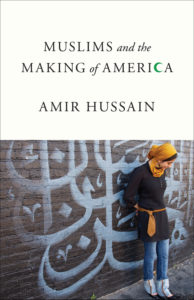 “There has never been an America without Muslims”—so begins Amir Hussain, one of the most important scholars and teachers of Islam in America. Hussain, who is himself an American Muslim, contends that Muslims played an essential role in the creation and cultivation of the United States.
“There has never been an America without Muslims”—so begins Amir Hussain, one of the most important scholars and teachers of Islam in America. Hussain, who is himself an American Muslim, contends that Muslims played an essential role in the creation and cultivation of the United States.
Memories of 9/11 and the rise of global terrorism fuel concerns about American Muslims. The fear of American Muslims in part stems from the stereotype that all followers of Islam are violent extremists who want to overturn the American way of life. Inherent to this stereotype is the popular misconception that Islam is a new religion to America.
In Muslims and the Making of America Hussain directly addresses both of these stereotypes. Far from undermining America, Islam and American Muslims have been, and continue to be, important threads in the fabric of American life. Hussain chronicles the history of Islam in America to underscore the valuable cultural influence of Muslims on American life. He then rivets attention on music, sports, and culture as key areas in which Muslims have shaped and transformed American identity. America, Hussain concludes, would not exist as it does today without the essential contributions made by its Muslim citizens.
Oil & Water: Two Faiths: One God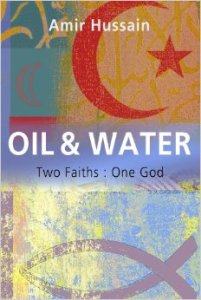
Listen to any news broadcast today and the message comes through loud and clear: Islam is a religion of violence and behind every Muslim there lurks a potential terrorist. Islam is a threat to values of the Christian West. They are like oil and water. Clearly, they don’t mix.
Oil & Water: Two Faiths One God confronts these popular perceptions head-on. With keen insight and gentle understanding, it explores the differences between Christianity and Islam, as well as the many things these two enduring faith traditions hold in common – including, first and foremost, their belief in and desire to be faithful to the one, true God; their shared roots and scripture (from the Jewish faith); and the spiritual values of peace and social justice.
Written for Christians by Muslim world-religions scholar Amir Hussain, the book is divided into two parts. Part 1 provides an overview of the Islamic faith and of the lives of Muslims in North America today. Chapters focus on the place and identity of Muslims in society, as well as on the importance and role of Muhammad, the Qur’an, and basic beliefs and practices (The Five Pillars of Islam).
Having provided a foundation for understanding, the book moves on, in Part 2, to explore key points for dialogue today, including issues of violence and jihad, the roles of women and men, and the mystical tradition within Islam. The final two chapters look at interfaith dialogue and the practical aspects of being good “neighbours.” In all of this, the book invites the reader to a place of reconciliation, to a place where the truth and value of each of these great faith traditions can be recognized and honoured by the other. In the end, the metaphor of oil and water is an interesting one for the reality of conflict and the hope for reconciliation between Islam and Christianity today.
World Religions: Western Traditions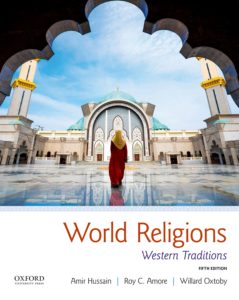
World Religions: Western Traditions, Fifth Edition, provides students with a thought-provoking survey of Jewish, Christian, Muslim, ancient, indigenous, and new religious traditions. The expert contributors offer an authoritative examination of the origins, central teachings, divisions and branches, rituals and practices, influences on culture, and responses to modern challenges for each tradition.
Ideal for courses in Western religions and comparative religions, World Religions: Western Traditions, Fifth Edition, combines a historically descriptive perspective with a spirit of sympathetic fascination.
World Religions: Eastern Traditions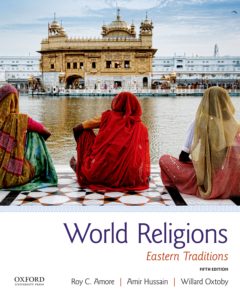
World Religions: Eastern Traditions, Fifth Edition, provides students with an accessible, engaging, and thought-provoking survey of Hinduism, Sikhism, Jainism, Buddhism, and Chinese, Korean, and Japanese religions. The expert contributors offer an authoritative examination of the origins, central teachings, divisions and branches, rituals and practices, influences on culture, and responses to modern challenges for each tradition.
Ideal for courses in Asian religions and comparative religions, World Religions: Eastern Traditions, Fifth Edition, combines a historically descriptive perspective with a spirit of sympathetic fascination.
A Concise Introduction to World Religions
Based on the best-selling World Religions: Eastern Traditions and World Religions: Western Traditions, A Concise Introduction to World Religions, Fourth Edition, is ideal for single-semester courses. Renowned contributors trace the origins and evolution of the major traditions, explain their essential teachings, outline their practices, and examine their interactions with modern 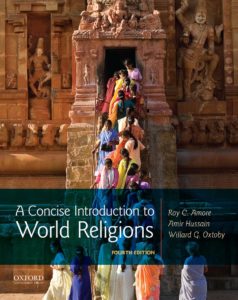 culture and society, while insightful introductory and concluding essays suggest countless avenues for further reflection and study.
culture and society, while insightful introductory and concluding essays suggest countless avenues for further reflection and study.
New to this Edition:
- “Interview” boxes bring to life the impact that a member of each religion is having on today’s world
- “Practice” boxes highlight religion as observed in daily life
- “Women in the Traditions” boxes highlight the essential roles played by women in each tradition
- A new introductory chapter, “Studying Religions,” gives more attention to theories about religion and methods for studying religion
- A new chapter (Ch. 3), “Religions of Antiquity,” provides both background and context for Western traditions
- Attention to the role of religion in current political and social issues